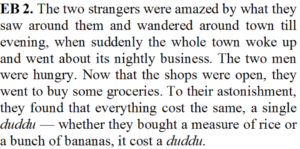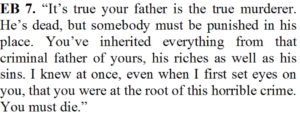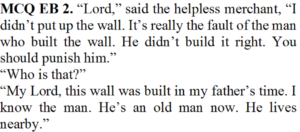In the Kingdom of Fools Class 9 Extra Questions and Answers CBSE English Chapter 4 NCERT Moments Extract Based Questions MCQs Short Answer Questions Long Answer Questions and Value Based Questions
IN THE KINGDOM OF FOOLS
(Extra Questions)
Extract Based Questions


(i) “They ordered that ……”. To whom does the word ‘they’ refer to?
(ii) Which word as used in the extract is synonymous of ‘plough’?
(iii) Why did people obey the order?
(iv) From which lesson this extract has been taken?


(i) Who have been considered as ‘two strangers’?
(ii) Why were ‘two strangers’ amazed?
(iii) When did the town conduct its usual business?
(iv) Please name the unit of currency used in the extract?
(v) Which word as used in the extract mean ‘surprise’?


(i) Whose brother ran to the king?
(ii) What ‘ancient trade’ was being pursued by the person who died?
(iii) Who, according to speaker of above extract is the wrongdoer?
(iv) What wrong was done by the merchant?
(v) What did the speaker demand for his family?


(i) Who is speaker of the first line of the extract?
(ii) Who is the speaker of the second line of the extract?
(iii) To whom does ‘this man’ refers to?
(iv) Who is referred as ‘poor man’ in above extract?
(v) What punishment was proposed for ‘you’?


(i) Who is speaker of the above extract?
(ii) Who was young at that time?
(iii) Who according to the extract got distracted by the jingling sound of anklet?
(iv) Who according to extract is held responsible for the death of burglar?
(v) Where the wall was got constructed?
(vi) Which word in the extract is antonym of ‘guilty’?


(i) Who is speaker of the extract?
(ii) To whom above extract is addressed?
(iii) Who is referred as ‘a lazy scoundrel’?
(iv) ‘he would give it now’. What does the word ‘it’ refer to?
(v) Who is speaker of the above extract?


(i) Who was held guilty as true culprit?
(ii) Why l\king decided to punish the merchant?
(iii) Who is speaker of the above extract?
(iv) Which word in the extract is synonym of ‘wealth’?


(i) Who carried ‘him’ to the place of execution?
(ii) Which word as used in the extract mean ‘order’?
(iii) To whom does the word ‘he’ refer to?
(iv) Which word in extract of synonym of ‘advice’?
(v) Was ‘he’ eventually executed?


(i) Who is referred as ‘he’ in the above extract?
(ii) Which word as used in the extract is synonym of ‘difficulty’?
(iii) Which word in the extract is antonym of ‘shout’?
(iv) How did guru come to know that his disciple was in trouble?
(v) What was the real intention of asking the question to the king?


(i) ‘All night they mourned’. Who is referred to as ‘they’?
(ii) Why were they mourning?
(iii) Which phrase in the extract mean ‘found them’?
(iv) What did ‘they’ told the guru and disciple?


(i) Why were guru and his disciple happy?
(a) the food was very cheap
(b) the town was beautiful
(c) they had eaten after a long time
(d) there was no pollution
(ii) What did it cost them to buy all the food?
(a) a duddu
(b) a rupee
(c) a cent
(d) a shilling
(iii) Who realised that it was kingdom of fools?
(a) disciple
(b) guru
(c) both (a) and (b)
(d) none of above
(iv) Which word in the extract is synonym of ‘purchase’?
(a) heard
(b) buy
(c) idea
(d) kingdom
(v) Based on the extract please classify following as fact and opinion
1. Food in the city was very cheap
2. Guru and disciple should not have eaten much
3. Disciple should always support his guru
4. Guru did not want to stay in the city
(a) F -1,2 and O -3,4
(b) F- 1,4 and O- 2,3
(c) F – 2,4 and O – 1,3
(d) F – 1,3 and O – 2,4


(i) Which phrase in the extract is synonym of ‘construct’?
(a) fault of
(b) nearby
(c) put up
(d) none of the above
(ii) Whom did the merchant blame?
(a) king
(b) himself
(c) dancing girls
(d) bricklayer
(iii) How far did the bricklayer reside?
(a) far
(b) close
(c) open
(d) beyond
(iv) Which of the following word has been used as a noun
(a) build
(b) fault
(c) helpless
(d) punish
(v) According to extract what is the correct sequence of following activities
1. construction of wall
2. king summons the merchant
3. bricklayer becomes old
4. wall collapses
(a) 1,2,3,4
(b) 1,3,4.2
(c) 3,1,4,2
(d) 4,3,2,1
Short Answer Questions (30-40 words)


Answer: The king had declared that anybody not following his orders would be punished by death. People got afraid. They did not want to die.
Therefore they followed orders of the king.


Answer: The disciple liked to stay in the kingdom. Every food item was very cheap there. So he could eat food of his choice and be happy.
The guru realised that it was a kingdom of fools. He did not want to stay there. One can never be sure what will happen to them next.


Answer: The king had ordered that days will be called nights. Everybody used to sleep during the daytime. Therefore the thief tried to conduct theft during day time.


Answer: The thief broke the wall of the house a rich merchant to sneak into the house. But the wall collapsed. Thief died on the spot. His brother approached king for justice.
He wanted compensation for the family because the thief had died while performing his ancient trade.


Answer: The merchant blamed the bricklayer for the collapse of the wall. He argued that the bricklayer had not constructed a good and strong wall.


Answer: The bricklayer blamed the dancing girl for collapse of the wall. He said that the dancing girl had walked several times up and down the street. Her anklets were jingling. Therefore the bricklayer could not keep his mind and his heart on the wall he was building the wall.


Answer: The dancing girl blamed the goldsmith for collapse of the wall. She said that the goldsmith did not make his jewellery on time. He asked her to come to his door several times on that day.


Answer: The goldsmith blamed the rich merchant. He said that the rich merchant had a marriage upcoming in his family. So the merchant was in a hurry to get his jewellery. Therefore the goldsmith could not make jewellery of the dancing girl before.


Answer: The goldsmith said that a rich merchant was in hurry to get his jewellery made. So work of dancing girl was delayed. That rich merchant was father of the merchant initially blamed. The king decided that son has inherited sins of his father. So the blame came back to the merchant.


Answer: The minister realised that the merchant was too thin to be properly put on the stake. He appealed to the king and the king agreed with his minister.
Thus the merchant was not put on the stake.
![]()
![]()
Answer: The king ordered servants to search for a person who was fat enough to suit the newly constructed stake. The servants saw the disciple and brought him to the king. The king ordered for execution of the disciple.


Answer: By the eagerness of the guru and the disciple to die first, the king got confused. Eventually, instead of guru and disciple, the king and the minister put themselves on the stake.
The fight was part of the plan to save life of the disciple.


Answer: The guru secretly told the king that the one who died first would become the king of the city. And the one who died second would become minister.
Hence the guru wanted to die first.


Answer: The people requested the guru and the disciple to become king and minister of their city.
Yes, the guru and the disciple accepted the request on certain conditions.


Answer: The nights were now called nights and the days were called days. Now people could get nothing for a duddu.
.
Long Answer questions (100-120 words)


Answer: When they reached city, it was daytime. They moved around the town but not a single person could be seen. All the shops were closed. As soon it was evening, the whole city came to life. All started doing their works. Shops were now open.
The shops had opened in the evening. They were hungry. They decided to buy groceries and food. They found that everything was priced at a duddu. Whether a measure of rice or a bunch of bananas, its cost was one duddu.
The guru relaised that such situation can be created by fools. He believed that if one stays with fools, one does not know what might happen next. So he decided to leave the city.


Answer: Fools are the most unpredictable lot in the world. One is never sure to the extent their imagination can wander. Thus they can cause any damage.
The foolish king and his minister had ordered days to be called as nights and nights as days.
The foolish king did not understand that the thief wanted to steal from the house of the merchant. Instead he questioned people after people for giving punishment. Everybody tried to escape by giving humorous excuses.
The king orders to find a person that would fit the stake. He was least concerned about punishing the guilty.
Finally, the guru could fool the king and his minister. They both volunteered to die.
Thus it is better to remain away from fools.


Answer: The disciple was delighted to observe that everything was available in the city for very low price. He loved to eat food. He did not listen to wise words of his guru and stayed in the city. He almost lost his life because of his greed.
The king wanted to be a king even in his next birth. He got fooled by the prediction of the guru. Because of his greed he sacrificed his own life.
They could not think logically owing to their greed. They did not use common sense to assess situation.
Thus greed keeps one away from logic and common sense.


Answer: I am of the opinion that people of the city were not fools.
They obeyed foolish orders of king and his minister because they wanted to survive. After all survival is the most important aspect.
People tried to take advantage of absence of common sense in king. From the merchant to the goldsmith, everybody gave humorous logics to save punishment. Only intelligent people can do so.
After death of the king and minister they realised that they needed new king and minister. They discussed amongst themselves. They persuaded the guru and his disciple to accept to rule their city.
Thus people of the city were wise.


Answer: The guru at once came to rescue his disciple after hearing his prayers through magical powers. The guru first scolded his disciple and then whispered something to him.
Now they both started a fight for getting punishment ahead of the other. Actually it was a ploy to deceive the king. Then the guru narrated a story to the king. He told the king that the first person to die on the new stake would become king of the city in the next birth. And the second person to die would become minister. The king took the bait, volunteered to first die himself. He also convinced the minister to die second.
Thus guru saved life of his disciple
****


0 Comments